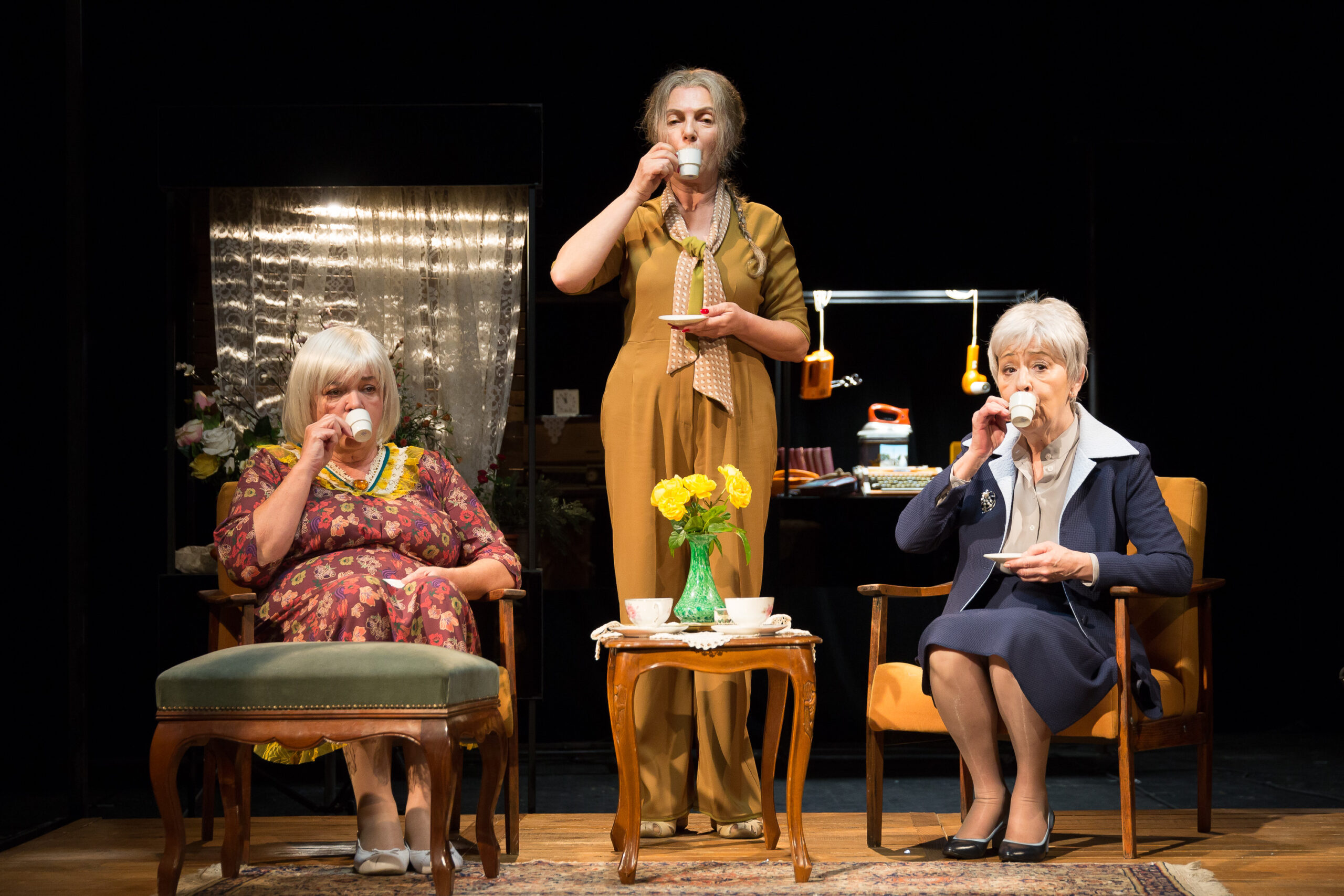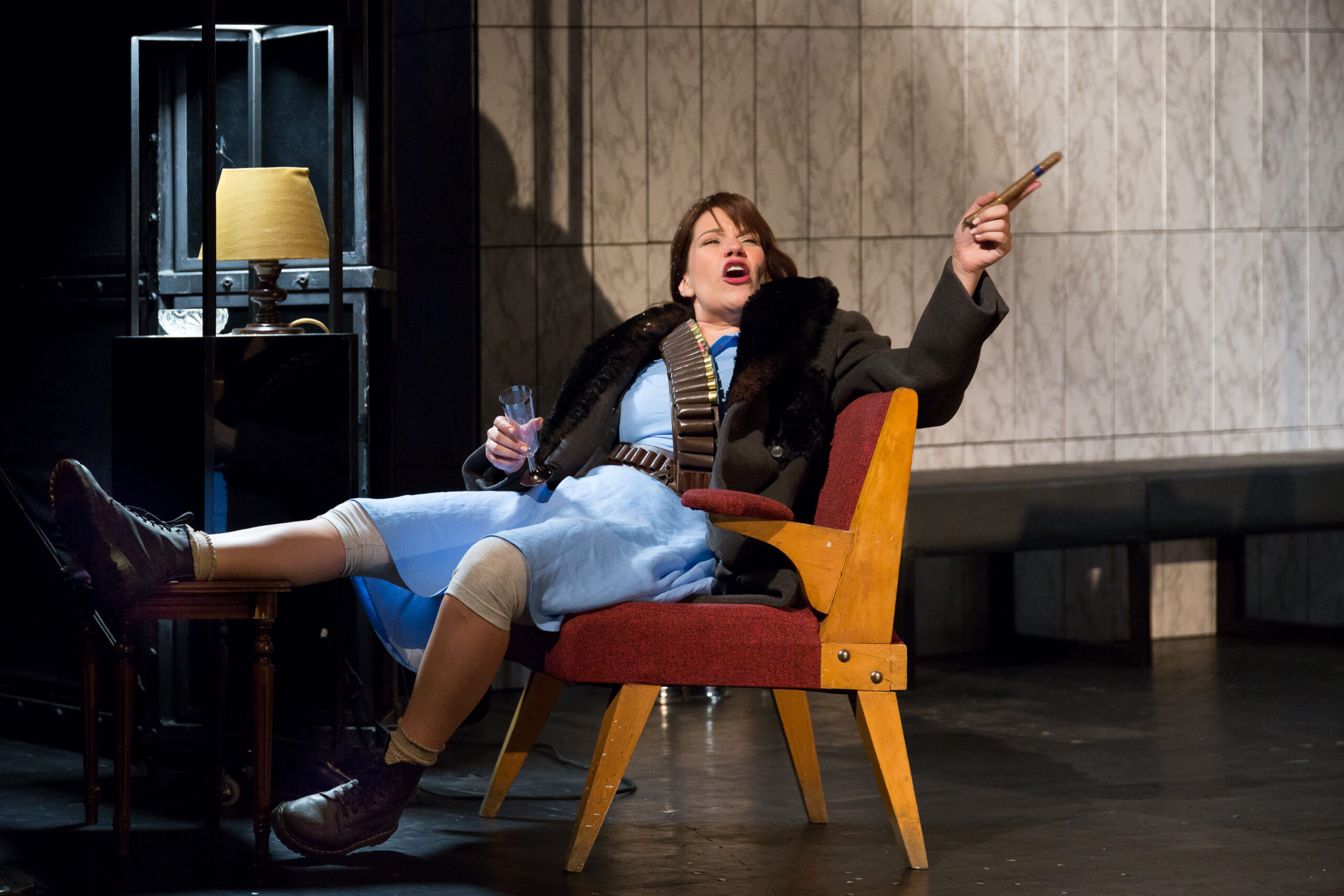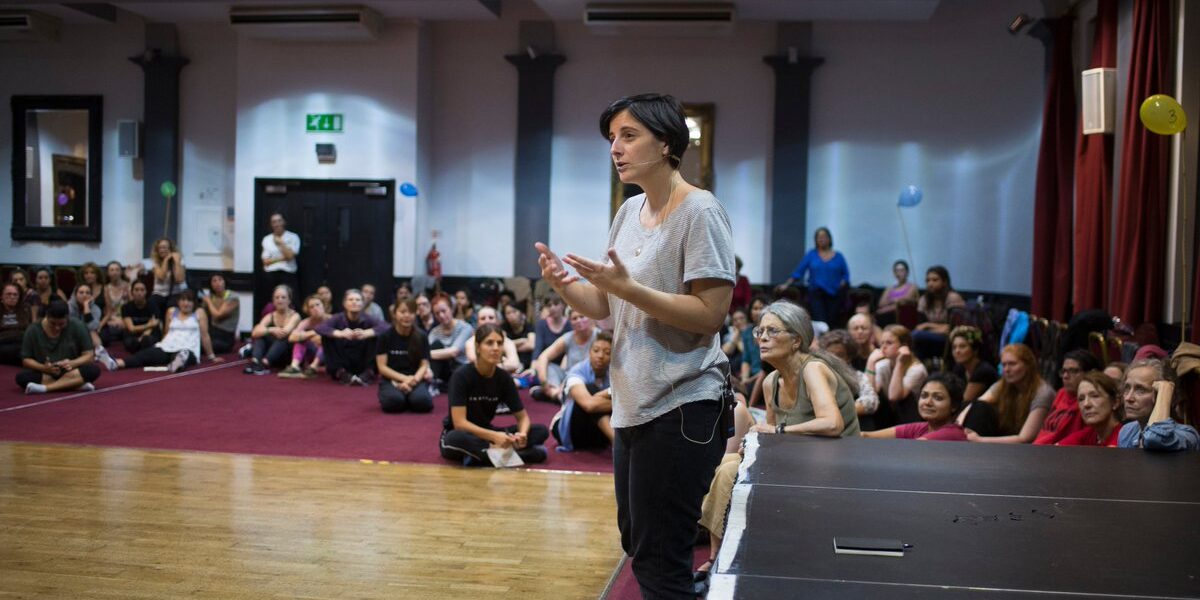Sasha Milavic Davies is a director, dramaturg, choreographer and movement director who has worked extensively in the UK, at the Royal Court, National Theatre and in the West End, and at Belgrade’s Atelje 212. She talks to Natasha Tripney about the differences between working in Serbian and UK theatre and stressful opening nights.
Sasha Milavic Davies: We didn’t really go to the theatre as a family in the UK, but when we went to Belgrade, we would visit one of my mum’s best friends, Branco Kockica, who was a big children’s star in the Yugoslav era. He had a theatre called Pozoriste Puž and we used to go to that theatre as kids. It was in the back of a functioning police station, a ramshackle place, but they got the top actors in Belgrade and the plays were great. We got to go backstage and hang out and have that whole experience of being in the theatre world.
Back in the UK, I saw companies like Complicitie, and I got really into that, I got really excited by it. After studying politics at university, I went to Lecoq and did a couple of years there. Then I asked Puž if they would mind if I wrote something for them. And they were tough. They said: only if it’s good.
I wrote something, which I wanted to direct, and they put me through the dramaturgical wringer, because it was for kids. It was a riff on how Shakespeare wrote Midsummer Night’s Dream, a fairy tale based around that, and I loved making it. That was the beginning of my career.
Natasha Tripney: What about things back in the UK?
Sasha Milavic Davies: While I was doing assistant directing work in London, at the Young Vic, as a resident assistant director, I helped set up the Yard Theatre [a theatre space in east London], with Jay Miller, Tarek Iskander who’s now at Battersea Arts Centre and friends from Lecoq.
I was trying to make both worlds work. And then after my work at Puž went well, one of the actors said you should go to a grown-up theatre. So I pitched [Nick Payne’s 2012 play] Constellations. That was a fun thing to do in Serbian. I was also kind of doing stuff in the UK. My career kind of went in parallel. In the Belgrade world I kept getting show after show and in the UK I went from doing assistant directing to directing to setting up a theatre. I have a very wide set of experiences. And now I’ve ended up with a associate dramaturg at the National Theatre as well as doing a lot of movement direction and opera direction.
Natasha Tripney: Where does the line lie between movement direction and choreography?
Sasha Milavic Davies: Sometimes it is choreography that I’m doing – for example, the show I’m currently working on [Local Hero at Chichester Festival Theatre] contains line dancing – but there is also the movement direction world that I come from, which is slightly separate world, it’s a Complicite world, a Lecoq world, all about ensemble physical theatre and creating a world within an empty space – using the ensemble to make the movement tell the story.
Natasha Tripney: With some of your work, like Touching the Void, based on Joe Simpson’s story of survival in the Andes, or Force Majeure, based on Ruben Östlund’s film, you somehow manage to bring the mountains into the theatre.
Sasha Milavic Davies: It’s interesting you say that because Lecoq was an athlete before he became a theatre person. He ended up living in the Alps and being a proper sports fanatic. He came from acrobatics and athletics. All the exercises that we were doing at school either involved miming or had the physical weight of sport. You’d pretend to throw a shotput or pretend to row or ice skate. Because that was a forward action – it was a front-foot thing. And it had tension. As long as you can create the right feeling of tension in the body and the space, you can create jeopardy in the room – as we did in Touching the Void.
Natasha Tripney: What do you see as the main differences between Serbian and UK theatre?
Sasha Milavic Davies: One of my good friends in Belgrade, the poet Milena Markovic, is constantly telling me about the differences between a Western sensibility and the Yugoslav/Serbian sensibility. The more work I’ve done there, the more I realised how much isn’t shared. And that’s not a bad thing
For example, when I pitched Constellations, the artistic director at Atelje 212 at the time said nobody will be interested in a play about physics. It’s a particularly British idea, this kind of subtle romantic comedy, in which you use a different world to serve your love story. In Serbia, they are more romantic, more melodramatic. It was interesting figuring out how to get the subtle form of the story – how does that translate? But it did work.

Moja Ti at Atelje 212. Photo Igor Mandić
Natasha Tripney: What came after Constellations?
Sasha Milavic Davies: The artistic director asked me if I wanted to do Olga Dimitrijević’s play Moja Ti. It had the nostalgic qualities that I recognised from having a connection to the country through my grandfather. When I first directed work in Belgrade, I had the language of a child because while I had been taught by my mother and my grandmother from an early age, at about the age of eight or nine, I stopped speaking and I just spoke English. So, when I went into the rehearsal room, I had this childish language. And that was also true of my view on the country – a slightly romantic idea about the place where my grandmother lived.
This story was about their generation, so I was interested in exploring that. Olga writes in such a way that the stage directions are as much part of her world as much part of the exposition as the dialogue, so we included a lot of that.
It’s a very progressive piece of work. The play is about a woman who is in her 80s and has been in lesbian relationship and now her partner has died, she’s losing the house because their relationship is not considered a marriage.
I had to work hard at convincing these three big women of Yugoslav theatre – Svetlana Bojković Gorica Popović, Tatjana Bošković – to do the show, these grand dames of the art world. I had a wonderful time making it, drinking coffee, telling stories and smoking in the rehearsal room at Atelje. But when they wanted to go home, they went home. I didn’t really control that situation. It was so different from London, but so refreshing.
Natasha Tripney: How was Moja Ti received?
Sasha Milavic Davies: Opening night was tough because we were invited to premiere after the closing ceremony and prize giving of Sterijino pozorje in Novi Sad. We were supposed to open just after the awards. But there was a huge scandal that year, because the jury and the judges decided not to award anybody any prizes, because they hated all the work. The auditorium was packed. Some people had banners and whistles and we heard all this. I was terrified. Then [famous Serbian actor] Miki Manojlović came onto the stage and took a microphone and said into it: this is what you have just done to me during this festival – you’ve taken a microphone and screamed at the audience – and I’m bored of it. The work didn’t fit into his traditional view of theatre. The audience was going mental as he just raged. Meanwhile, me and my dramaturg were sweating in the corner upstairs.

Moja Ti at Atelje 212. Photo Igor Mandić
Natasha Tripney: Oh wow. Then what happened?
Sasha Milavic Davies. This lasted for about 15 minutes until Miki threw the microphone to the floor. And then the head of festival came on and said now we will have our premiere from Belgrade, Moja Ti. The audience were on the verge of rioting. I was terrified. The show opens with Tatjana Bošković walking from the back like she’s walking through a museum, but she’d heard all of this, and she took her sweet time. She just wandered around. You could hear that clip of her shoes. And she whispered the first line of the play. And then she went on to berate the corruption and the mess and the crap that started in the mid-80s, leading up until now, in this most unbelievably heartfelt monologue. There couldn’t have been a more perfect opening. Everyone loved it – it was one of the most exciting theatrical experiences I’ve had in my entire life.
Natasha Tripney: What’s the most striking thing about the different ways of working, the different approaches to work?
Sasha Milavic Davies: I think about this every time I go back there. In every rehearsal process. One [of the main things] is the fact that it’s not called work over there. It’s more a vocation, or at least it is not a job as much as it is here. It doesn’t feel like there are structures around what you do, so much as structures that exist in our traditional rituals, like the way we would start every rehearsal in the buffet upstairs at the theatre and people would bring pastries to share in the morning, religiously bring them in and share them with everyone. It was a kind of village atmosphere, sharing these things.
There’s also something more unregulated about working in Serbia than there is working here. And that brings with it all the positives and all the negatives. Because everybody knows that regulation is a useful thing for your health, for your mental health, for your body, your world. But there are parts of regulation that also curtail creative expression. So that I think the most neutral way I can describe it is that it’s more unregulated there than it is here.
Natasha Tripney: Having spent time in both countries, in both systems, what else stands out?
Sasha Milavic Davies: When I was making my first show, I went to see everything in the repertoire. I spent my days and nights in the theatre. And I remember seeing one show, which is called Smrtonosna Motoristika, in which one of the actors, Mladja Andrejevic, comes forward at one point in the show and sings wistfully to himself. And all around me people very, very softly started singing too. It wasn’t part of the show. It wasn’t loud. It was a personal thing. Everybody was singing this song under their breath and it made my hair stand on end, because I could hear the whole audience singing this very beautiful and passionate lament. And I almost broke out into tears because I have not experienced that kind of collective emotional thing before. But when I thought about it later, when I was describing to people, I realised the only reason that it works is because of homogeneity, because everybody in that room, apart from me, knew this song. And there are ups and downs to that. But it was overwhelmingly beautiful.
For more information on Moja Ti, visit: Atelje212.rs
Natasha Tripney is a writer, editor and critic based in London and Belgrade. She is the international editor for The Stage, the newspaper of the UK theatre industry. In 2011, she co-founded Exeunt, an online theatre magazine, which she edited until 2016. She is a contributor to the Guardian, Evening Standard, the BBC, Tortoise and Kosovo 2.0








